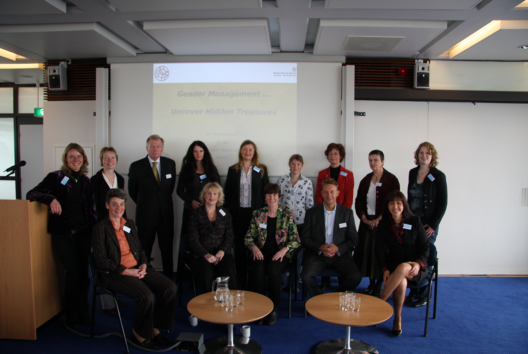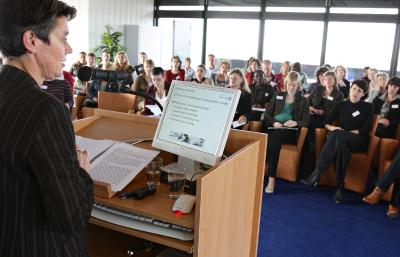On Thursday November 6th 2008 the fourth conference of the Female Faculty Network Twente took place at the University of Twente. The theme of the conference was ‘Gender Management … Uncover Hidden Treasures’. The main program of that day consisted of some lectures in the morning. The morning session was closed with a panel discussion. Two workshops were organized in the afternoon. The slides of the lectures and a summary of the panel discussion are accessible via this website.
In the ‘UT nieuws’ of November 13th also an article about the conference was placed.
|
Speakers at the conference and board of the FFNT. Standing from left to right: Wilma Dierkes, Annemarie Braakman, Hans Roosendaal, Angelika Mader, Liudvika Leisyte, Genie Stoffels, Marjolein Rietman, Joy Clancy, Marieke Snijder. Sitting from left to right: Edith Snoey, Yvonne Benschop, Wouke Lam, Arjan Brunger, Laura Franco Garcia. |
`Gender Equality, A business case’
On Thursday, November 6, the Female Faculty Network Twente (FFNT) hosted its fourth conference where 60 participants gathered at the top floor of the Horst Tower to listen to speakers about the best practices of gender management. The conference location could be symbolic of the decades-long struggle for women academics who have sought to be equally represented in the top positions at the university. `The Executive Board (CvB) sees getting more women in higher positions as a business case,' said Dr. Arjan Brunger, the university's Director of Personnel (PA&O).
|
Edith Snoey gave a lecture entitled, `Experiences with gender issues within the unions'at the fourth annual Female Faculty Network conference in the Horst Tower. |
In his speech, Brunger pointed out that big companies, who show the best financial outcomes and results, are companies that have mixed gender management. Diversity, he said, may bring about more conflicts, but with good management, a conflict can even be seen as productive. The Executive Board is implementing three tenure track positions, exclusively for female scientist, which has already resulted in 27 applications being submitted by women from around the world.
Other successful programs and initiatives implemented by the UT in recent years have been the Mentor-Mentee Network and the Ambassadors Network, both of which aim to keep an open dialogue about gender issues and advance females in their career path.
Dr. Yvonne Bischop, a professor of Organizational Behavior at the Nijmegen School of Management, advised female scientist to verbally express their ambitions at an early stage. `When I started out as a PhD student, I made it very clear that I wanted to be a professor, and eventually it happened,' she said.
Bischop went on to describe the `rock bottom period' in 1996 when only 4.5 percent of professors were female. Yet she maintains optimism about today's growing momentum, which she thinks is caused in part by looking at gender equality as a `business issue' rather than speaking about the situation in terms of social injustice and equality. `We can take the business case arguments and work towards telling people that part of this issue is a business issue, and universities will lose out on half the talent pool if they are not promoting women to their fullest,' she added.
Following Bischop was the chairwomen of the Netherlands' biggest trade union federation Edith Snoey. Her experience has taught her that the scales are still tipped in strong favor of men. Snoey reflected, `We still see that women are not equally rewarded. Women are lagging behind when it comes to areas like pension buildup.'
How world companies approach the business case formula to look at gender issues was explained by Wouke Lam, the program manager of Shell International Information Technology. Since the mid-nineties Dutch Royal Shell started to work on a global level, changing the way the organization was run. Shell's CEO Jeroen van der Veer stated, `Diversity and inclusion are vital for winning in today's business environment, by integrating diversity and inclusiveness into the mainstream aspects of the business.'
Instead of legally binding quotas, Shell sets recruitment targets to increase the number of female employees, and recruiters are measured against these targets. According to Lam, Shell delivered on the target to hire 28 percent females in technical job positions, which corresponds with the number of female technical students graduating from universities. On the commercial side, the company was able to achieve even better percentages with an equal representation of women and men.
These top-down initiatives at Shell led to gender awareness training sessions for leadership teams where males and females were shown the video Invisible Rules, which helped raise awareness about gender differences. For example if females nod their heads, said Lam, it indicates they are encouraging the progression of a conversation. On the contrary, when males send this same non-verbal cue, it indicates he is agreeing to whatever is being spoken. `It's like the ying and the yang, where we create a workplace for all talents to develop to the fullest potential and really reach the optimal business benefits,' she added.
The last speaker, UT Professor of Strategic Management Hans Roosendaal, agreed on the diagnosis - more females should be represented in top positions - but he cautioned that it is difficult to find the right cure. `Sometimes we know the cure can be worse than the disease,' he said. In ten years, according Roosendaal, 50 percent of the chaired professors in Europe will be replaced. This is something he views as an opportunity to create new strategies by adopting policies at the institutional level. This could also leave the door wide open for female scientists who want to advance in their careers.
Reference: UT nieuws donderdag 13 november 2008, jaargang 43, nr. 33


